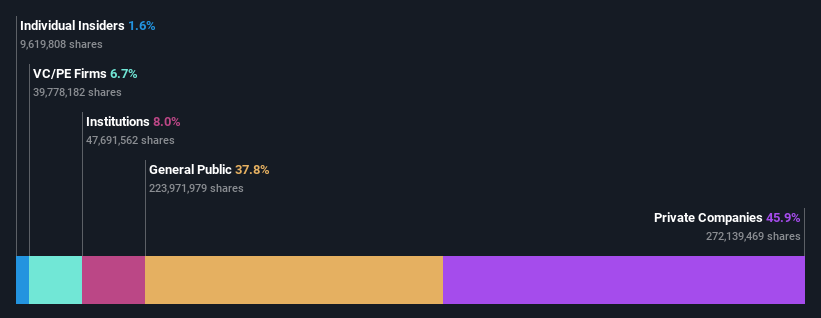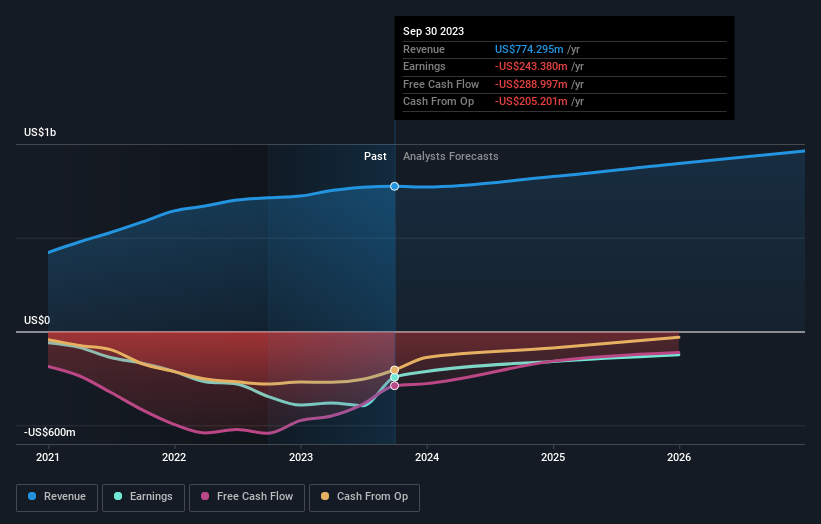Oatly Group AB's (NASDAQ:OTLY) largest shareholders are private companies with 46% ownership, individual investors own 38%
Key Insights
The considerable ownership by private companies in Oatly Group indicates that they collectively have a greater say in management and business strategy
A total of 2 investors have a majority stake in the company with 53% ownership
Using data from analyst forecasts alongside ownership research, one can better assess the future performance of a company
Every investor in Oatly Group AB (NASDAQ:OTLY) should be aware of the most powerful shareholder groups. And the group that holds the biggest piece of the pie are private companies with 46% ownership. In other words, the group stands to gain the most (or lose the most) from their investment into the company.
Individual investors, on the other hand, account for 38% of the company's stockholders.
Let's delve deeper into each type of owner of Oatly Group, beginning with the chart below.
View our latest analysis for Oatly Group
What Does The Institutional Ownership Tell Us About Oatly Group?
Many institutions measure their performance against an index that approximates the local market. So they usually pay more attention to companies that are included in major indices.
We can see that Oatly Group does have institutional investors; and they hold a good portion of the company's stock. This implies the analysts working for those institutions have looked at the stock and they like it. But just like anyone else, they could be wrong. If multiple institutions change their view on a stock at the same time, you could see the share price drop fast. It's therefore worth looking at Oatly Group's earnings history below. Of course, the future is what really matters.
We note that hedge funds don't have a meaningful investment in Oatly Group. The company's largest shareholder is China Resources Verlinvest Health Investment Limited, with ownership of 46%. Meanwhile, the second and third largest shareholders, hold 6.7% and 2.9%, of the shares outstanding, respectively.
To make our study more interesting, we found that the top 2 shareholders have a majority ownership in the company, meaning that they are powerful enough to influence the decisions of the company.
While it makes sense to study institutional ownership data for a company, it also makes sense to study analyst sentiments to know which way the wind is blowing. There are plenty of analysts covering the stock, so it might be worth seeing what they are forecasting, too.
Insider Ownership Of Oatly Group
The definition of an insider can differ slightly between different countries, but members of the board of directors always count. The company management answer to the board and the latter should represent the interests of shareholders. Notably, sometimes top-level managers are on the board themselves.
Insider ownership is positive when it signals leadership are thinking like the true owners of the company. However, high insider ownership can also give immense power to a small group within the company. This can be negative in some circumstances.
Our most recent data indicates that insiders own some shares in Oatly Group AB. In their own names, insiders own US$11m worth of stock in the US$670m company. This shows at least some alignment. You can click here to see if those insiders have been buying or selling.
General Public Ownership
The general public, who are usually individual investors, hold a 38% stake in Oatly Group. This size of ownership, while considerable, may not be enough to change company policy if the decision is not in sync with other large shareholders.
Private Equity Ownership
With a stake of 6.7%, private equity firms could influence the Oatly Group board. Sometimes we see private equity stick around for the long term, but generally speaking they have a shorter investment horizon and -- as the name suggests -- don't invest in public companies much. After some time they may look to sell and redeploy capital elsewhere.
Private Company Ownership
It seems that Private Companies own 46%, of the Oatly Group stock. Private companies may be related parties. Sometimes insiders have an interest in a public company through a holding in a private company, rather than in their own capacity as an individual. While it's hard to draw any broad stroke conclusions, it is worth noting as an area for further research.
Next Steps:
While it is well worth considering the different groups that own a company, there are other factors that are even more important. Be aware that Oatly Group is showing 3 warning signs in our investment analysis , and 1 of those is significant...
But ultimately it is the future, not the past, that will determine how well the owners of this business will do. Therefore we think it advisable to take a look at this free report showing whether analysts are predicting a brighter future.
NB: Figures in this article are calculated using data from the last twelve months, which refer to the 12-month period ending on the last date of the month the financial statement is dated. This may not be consistent with full year annual report figures.
Have feedback on this article? Concerned about the content? Get in touch with us directly. Alternatively, email editorial-team (at) simplywallst.com.
This article by Simply Wall St is general in nature. We provide commentary based on historical data and analyst forecasts only using an unbiased methodology and our articles are not intended to be financial advice. It does not constitute a recommendation to buy or sell any stock, and does not take account of your objectives, or your financial situation. We aim to bring you long-term focused analysis driven by fundamental data. Note that our analysis may not factor in the latest price-sensitive company announcements or qualitative material. Simply Wall St has no position in any stocks mentioned.

 Yahoo Finance
Yahoo Finance 

